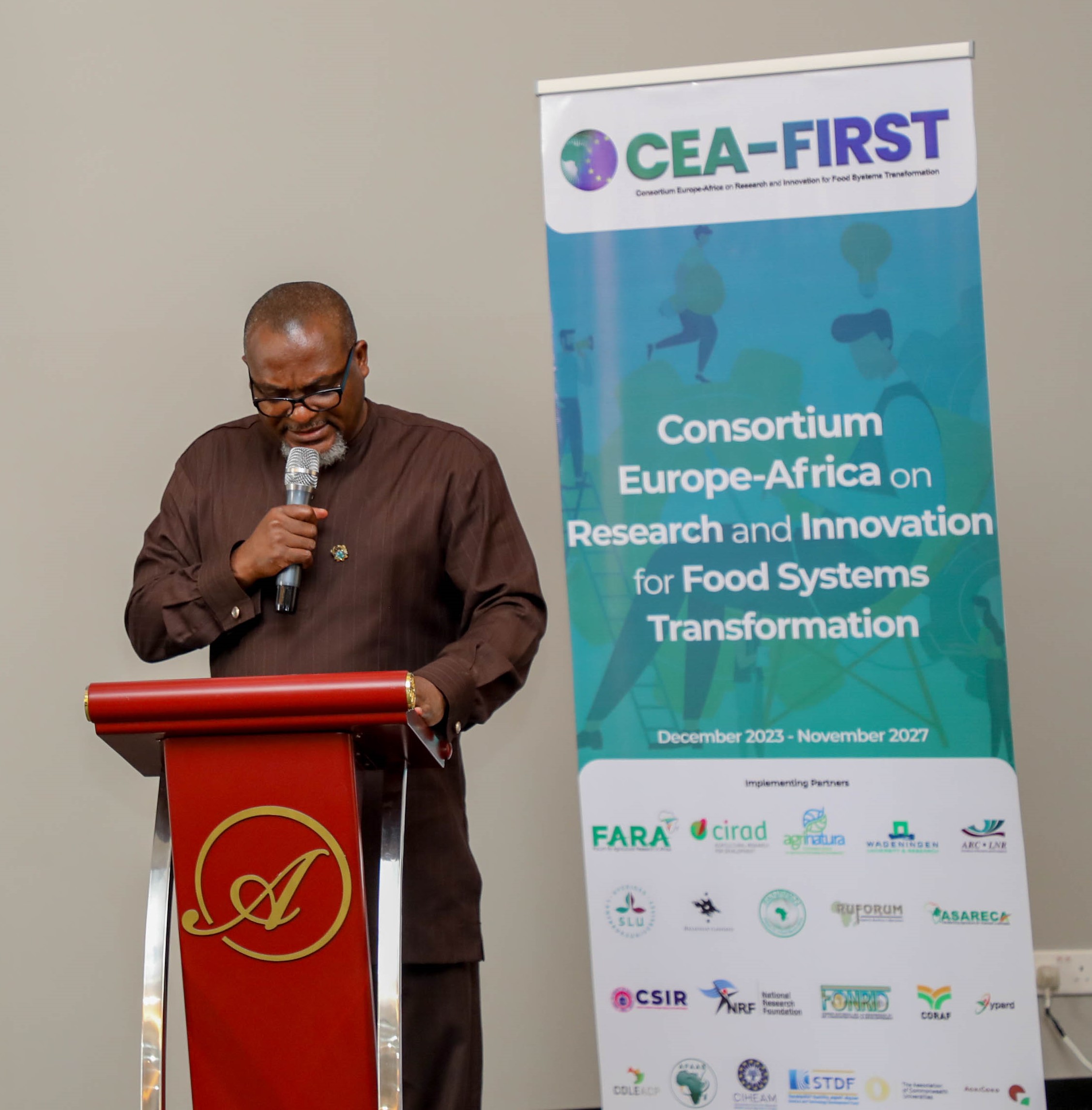The African Union and the European Union alongside a number of implementing partners have launched the Consortium Europe-Africa on Research and Innovation for Food Systems Transformation #CEA_FIRST Project.
The main objectives of CEA-FIRST are as follows:
13/02 CNR Citinewsroom/Ghana Consortium Europe Africa on Research and Innovation for Food Systems Transformation project launchedCEA-FIRST, the Consortium Europe Africa on Research and Innovation for Food Systems Transformation began on 1 December 2023 and will run for 4 years.
- CEA FIRST is funded by the European Union as part of the Green Deal’s “From Farm to Fork” strategy (Horizon Europe budget envelope). It forms a crucial part of the EU’s “Global Gateway” strategic vision, which aims to establish sustainable and reliable connections serving citizens and the planet. This vision addresses pressing global challenges, from combating climate change to enhancing the competitiveness and security of global supply chains, particularly in Africa.
The project brings together 22 partners from Europe and Africa covering a wide range of expertise and stakeholders (research, NGOs, donors, extension workers, etc.) involved in the field of food and nutritional security and sustainable agriculture. It consists partly from the former LEAP4FNSSA and PAEPARD, extended with new public and private network partners.
The main objectives of CEA-FIRST are as follows:
- Providing public access to an extensive platform of knowledge in food and nutrition security and sustainable agriculture.
- Developing a robust methodology for analyzing Research and Innovation (R&I) activities and priorities.
- Supporting the update of the AU-EU R&I partnership roadmap.
- Establishing operational and thematic research working groups.
* COLEAD leads the CEA-FIRST working group which focuses on fostering linkages and multi-stakeholder engagement in programmes and initiatives related to food and nutrition security and sustainable agriculture. Concurrently, COLEAD will co-lead efforts to strengthen the link between research, innovation, and their practical application. - CEA-FIRST will facilitate connections between the IRC and the AU-EU high-level political dialogue.
- It will create a learning environment, including communication channels, to support multi stakeholder networks and to strengthen R&I coordination.
CEA-FIRST will operationalise the International Research Consortium (IRC) as a long-term platform on food and nutrition security and sustainable agriculture (FNSSA) in line with the FNSSA Roadmap of the AU-EU High-Level Policy Dialogue (HLPD).
- The IRC is a member-based, multi-actor platform and will work towards increasing synergies andcoherence while reducing fragmentation and duplication of research efforts. Its aim is to promote higher returns on investments and impact on business development in Africa and Europe, by linking actors, research and innovation projects, initiatives, and funding programmes.
- The final output will be a fully functional IRC. In the context of an essential transition in agri-food systems, compounded by the challenges of climate change and demographic shifts,
the IRC is positioning itself as a vital tool for fostering an equitable and sustainable research and innovation partnership between Africa and Europe. This partnership focuses on bolstering agriculture as a key driver of economic development. - The IRC will also serve related AU-EU policy priorities, such as the Climate Change and Sustainable Energy and the Innovation Agenda of the HLPD, as well as the European Green Deal priorities (and farm to fork strategy) and the AU priorities like the African Free Trade Area.
In his opening remarks to kick-off the International Research Consortium and the #CEA_FIRST Project, the Executive Director of FARA, Dr. Aggrey Agumya recognized: "CEA-First represents a larger and far-reaching formation that promises to revolutionize the partnership and working arrangements between African and European institutions."
Participants
- Forum For Agricultural Research In Africa (FARA), Ghana (Coordinator)
- Centre For International Cooperation In Agronomic Research For DEVELOPMENT (CIRAD), France
- European Alliance On Agricultural Knowledge For Development (Agrinatura), France
- Stichting Wageningen Research (WUR), the Netherlands
- Agricultural Research Council Institute For Soil Climate And Water (ARC), South Africa
- Sveriges Lantbruksuniversitet (SLU), Sweden
- Helsingin Yliopisto (UH), Finland
- Food Agriculture And Natural Resources Policy Analysis Network (FANRPAN), South Africa
- Regional Universities Forum For Capacity Building In Agriculture (RUFORUM), Uganda
- Association Of Commonwealth Universities (ACU), United Kingdom
- The Registered Trustees of The Association for Strengthening Agricultural Research In Eastern
And Central Africa (ASARECA), Uganda - Council For Scientific And Industrial Research (CSIR), Ghana
- National Research Agency (ANR), France
- National Research Foundation (NRF), South Africa
- National Fund For Research And Innovation For Development (FONRID), Burkina Faso
- West And Central Africa Council For Agricultural Research And Development (CORAF), Senegal
- Young Professionals For Agricultural Development (YPARD), Germany
- Entrepreneurship-Agriculture-Development Liaison Committee (COLEAD), Switzerland
- African Forum For Agricultural Advisory Services (AFAAS), Uganda
- Agricord, Brussels Belgium
- Ciheam, Bari Italy
- Science, Technology And Innovation Funding Authority (STDF) Egypt
See also:
The project brings together 22 partners from Europe and Africa covering a wide range of expertise and stakeholders (research, NGOs, donors, extension workers, etc.) involved in the field of food and nutritional security and sustainable agriculture. It consists partly on lessons from the former #PAEPARD initiative, to the LEAP4FNSSA and now extended with new public and private network partners.










No comments:
Post a Comment